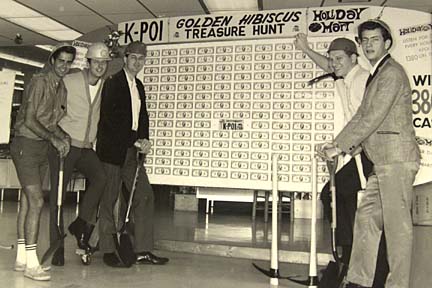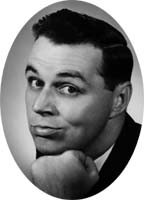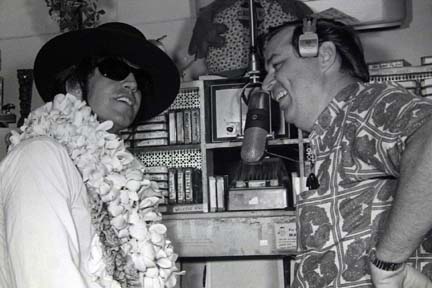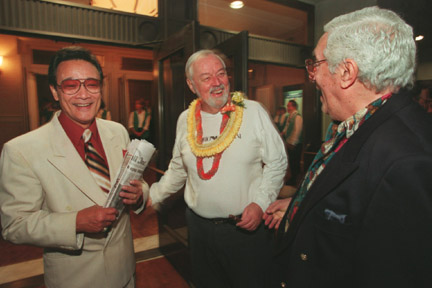
[ Q&A ]
COURTESY TOM MOFFATT
The Poi Boys are ready to unearth treasure during a promotion at Holiday Mart in the '60s. From left are Steve Nicolet, Tom Moffatt, Dave Donnelly, Tom Rounds and an unidentified "short timer."
Donnelly had a good life
and he knew it
Like many of the characters Dave Donnelly played onstage, he was larger than life -- whether entertaining folks as a KPOI radio personality, as Mr. Checkers in the "Checkers and Pogo" children's TV show or through his column for the Honolulu Star-Bulletin, which ran for 35 years. Whatever he did, he did it with heart, always encouraging others along the way. That's why his death, at age 66, is a loss to so many.
Longtime friend and publicist Elissa Josephsohn reflects: "Dave was a theater person, who loved characters and plot. He loved the use of words. He could make a good story even better. He loved good humor. He loved language."
"The Moose" Dave Donnelly in an early publicity pose.
Don Murphy recalls when he first opened Murphy's Bar & Grill, Donnelly would often suggest how things should be done. Murphy would say, "You know, Donnelly, maybe you ought to own Murphy's."
Donnelly would quip, "A couple of editors have already accused me of that."
Remembering his friend, Murphy says fondly: "He was a character. He loved writing his column. He loved to stay on top of it. He loved to sit at the end of the bar with his friends and cackle and giggle and make jokes."
When I caught up with Donnelly a few years ago, he was in fine form, warming up with some zingers for his cronies, who were about to roast, or "Stir Fry," him to mark the 30th anniversary of his column.
Perched high above Honolulu in his Harbor Square home, Donnelly had a bird's-eye view of the city he loved to cover in his daily musings. Born in 1937, during the Depression, he was proud of his Irish roots and of being raised with the "old Protestant, Midwest work ethic."
"I was born in a little town called Keokuk, Iowa. That's right on the banks of the Mississippi River, just 63 miles north of Hannibal, Mo., where Mark Twain country was, where Tom Sawyer lived, all that," is how he put it.
Must have been something in the water. Like Twain, Dave Donnelly sure could spin a yarn or two.
* * * * *Following are portions of my interview, as the local anchor/host of "All Things Considered" on Hawaii Public Radio, with Dave Donnelly. It took place on Feb. 2, 1999, on the eve of his "Stir Fry" at the Hawaii Theatre.
HC: What are your family roots, and how did some of the values that you learned growing up affect you throughout your life?
DD: I grew up with some very hard-working parents, who didn't have a lot of money. We were a poor family but rich in spirit, is what the Irish always say.
I was a surprise baby, in that when I was born, my closest sibling was already seven years older that me. I was the sixth of six (children). I wasn't suppose to happen at all, but out I popped.
My father was 57 and my mother was 46, and so I grew up with an older couple. I remember going to kindergarten, and the teacher said, "Oh, your grandma and grandpa brought you to school." And I said, "No, my mom and dad did."
And she said, "No, that's your grandma and grandpa." And I said, "No, that's my mom and dad!"
And she turned to my mom and dad, and she said, "He thinks you're his mom and dad." And they said, "We are!" And she almost passed out on the spot because she had never seen parents that old taking a kid to kindergarten before. (Chuckles) My mother was 51 and my dad was 62 (by then).
My father was a laborer. My mother was a housekeeper, and she helped care for old women in the community, sit with them, be a companion for them. And I grew up with the Protestant ethic of if you want to make money, you gotta go out and do it. So I've had jobs since I was like 10 or 11 years old, of one kind or another.
COURTESY TOM MOFFATT
Among the celebs Dave Donnelly interviewed was Mark Lindsey of Paul Revere and the Raiders.
HC: How did you end up here in Hawaii?
DD: I joined the Navy immediately after high school. They sent me to Great Lakes. I went through training there; they made me a Navy journalist, sent me to Hawaii, and I spent the whole time sitting at Pearl Harbor. And I've been here ever since.
HC: How did you end up landing a job at the hottest radio station in town in the '60s, KPOI?
DD: Like everything else in my life, sheer dumb luck. I happened to know a guy who was doing some news writing for the station. ... One day, he decided he was going to leave the island. He said, "You know, I'm going to be leaving, and this job is going to be opening up. Would you be interested?" And I said, "Sure." So he took me down to KPOI and introduced me to Ron Jacobs and Tom Moffatt, and I got hired on the spot. I never even auditioned.
And eventually that led to reading the news as well as writing it. And eventually that led to doing a disc jockey show. And I did an all-night show for a while, and then eventually I did a morning show and eventually I became program director of the station.
HC: You had a lot of fun in radio back then.
DD: Oh, it was a circus. That's what we called it: circus radio. You never knew what we were going to be doing next. We had a variety of "thons." We had a wake-athon, sleep-athon, talk-athon, you name the thon. We had a drama-athon, bowl-athon.
HC: Insult-athon.
DD: We had an insult-athon, as a matter of fact. Yeah, Tom Rounds and I insulted each other nonstop for a great number of minutes. Callers would call in when each of us was on the air and give us new insults we could add to our list. ... Tom Moffatt was the moderator, and he kept trying to keep peace with everything. It was just a fun, silly thing that we did. It lasted one day and it was over. But you never knew what people were going to be doing next down there.
A woman told me one time, "I always had my radio set to KPOI because if it isn't, you're afraid you might miss something." And I think that's a magic ingredient that most stations don't have anymore. Nowadays, they just give away money, and people listen for greed, rather than to be entertained.
HC: How did you end up with the name you went by, "The Moose"?
DD: Tom Rounds gave me that nickname when I was first going on the air. He said, "Let's see, your name is Dave, so we'll call you Moose." I said, "I don't get the connection." He said, "Everybody's got to have a nickname, so you're the Moose."
HC: And from there you went on to become Mr. Checkers in "Checkers and Pogo"?
DD: Yeah, I'd been working at KPOI for seven years, and one day, Jim Hawthorne -- who had started "The Checkers and Pogo Show" with Morgan White, who was Pogo -- he and Cec Heftel, who owned the stationed, had a bit of brouhaha on how the show ought to be done and things like that. And the upshot was, Jim quit.
So Cec put out a feeler to Jack Kellner, I believe it was, and Kellner called me and said, "Would you be interested in doing this TV show?" And I said, "Well, this is like doing theater for youth." And I'd been doing theater for youth for years. And here's an opportunity to do it on a regular basis and get paid for it. So I said, "Sure."
So I went over, and I auditioned on the air and got hired and became Mr. Checkers at, like, twice the money I was making on KPOI radio. So I said, "Hey this is not bad at all." So I did that for a year.
Then a similar thing happened. Got wind of the fact that the columnist that they brought in to be the big three-dot columnist at the Star-Bulletin just didn't work out. ... And again I happened to be having lunch with a guy from the newspaper, and he said he just got notified that morning they weren't going to be keeping this new columnist. And I said, "Why don't you put a bee in the right bonnet that if they'd be interested in me, I'd be interested in doing that job?"
I'd been writing a column on rock music for the paper for two years, from the days when I was at KPOI. So he went back and he mentioned it, and I got a call that afternoon saying, "Can you come down?" I went down; we talked. The next thing I know ... I'm walking out the door and I'm the new three-dot columnist.
STAR-BULLETIN / 1999
Jimmy Borges, left, and Henry Woltag, right, kid around with Dave Donnelly outside the Hawaii Theatre before his "roast."
HC: You once said you've really never had to write a resume.
DD: That's true. I never did. Those are the only three jobs I've ever had, other than being in the service. And you certainly didn't need a resume for that -- they were happy to have volunteers in those days.
As for the theater things, I'd just go and audition. And after a while I stopped auditioning. People would just call me and say, "Can you come and direct this play?" or "Can you come and be in this play?"
HC: What were some of the favorite roles that you've played in theater?
DD: Oh boy, so many. Back in college days, I guess, the "Death of a Salesman" I did, which was a very powerful piece. I remember at the end of the play, after Willie Loman, who I played, died, they had a graveyard scene, and the widow is out and she's talking to Willie. And on opening night I remember I was sitting backstage, waiting to go on for the curtain call -- actually, we didn't have a curtain call, but I was just listening to the end of the show -- and I realized that I was hearing sobs, throughout the audience. I mean, the entire Farrington Hall was sobbing uncontrollably over this piece of theater that we had just put on. And I thought, My god, theater has such power to provoke and evoke this emotion in people!
After college I went on to direct a great number of shows for the Oumansky Magic Ring Theater at the Hilton Hawaiian Village. I guess "Who's Afraid of Virginia Wolff" was certainly one of the most powerful ones. But we did a lot of light comedies, too, like a "A Thurber Carnival" and "Beyond the Fringe."
But when I started doing the column full time, my ability to rehearse every night, as you need to do when you're doing theater, went down because I had to get out and around town. So, I had to make a choice, and theater, unfortunately, started playing a little bit of a second fiddle to my profession, which was, after all, how I was making a living supporting a family.
HC: You also directed a young rising star in local theater who went on to make quite a name for herself, Bette Midler. What was that like?
DD: I directed Bette in a play for the Theatre for Youth called "Young Tom Jefferson." And she played Tom Jefferson's girlfriend and had a couple of songs that she sang in the show. She was fun. She was totally unpolished in those days ... but since then she's certainly risen to the top of her profession. I've gotten together with her a couple times since then in New York. Had a lot of fun with her. But now she's gone on to superstardom. We've totally fallen out of contact now, which is just a shame.
Besides Bette Midler, I directed one other guy. He is one of the very few people in this world who's won an Oscar, an Emmy, a Grammy and a Tony, and his name is Dean Pitchford. ... When I did a production of "Waiting for Godot," back in 1965 -- I'm a big Sam Beckett fan, always have been -- there was a part for a 13-year-old boy in it. And Dean Pitchford came to the auditions, and I cast him as the boy in that part. ... Since then he's gone on to win all those awards for "Fame" or "Footloose" and various other musical things. Quite a talented young man.
HC: That must be satisfying, knowing that.
DD: It's fun if you've had some small part in making theater fun for that person. He might have otherwise gone out and been a carpenter. Although, the carpenters do pretty good.
HC: You've always had this passion for theater. What do you love so much about being a part of it?
DD: I think I explained a little bit of it with the "Death of a Salesman" reference. The feeling of power, that you can help a playwright get across what he's trying to say. It's a collaborative art, theater, between the playwright and the actor and the director and audience. It's wonderful when you can fulfill your part in that collaboration, be it drama or be it comedy or mystery or whatever. It's a wonderful opportunity to interact with an audience and to affect them and maybe affect their lives even, in an altruistic sense.
HC: You also affect a lot of people through the power of the pen, through writing your three-dot column.
DD: I suppose to some people it does. People are always saying, "Oh, my dad was thrilled to read about himself in the column," or "my mom" or whatever. And I suppose it does have an effect on people. I don't think of it in the same way that I do with the theater. But it's a different kind of feeling and not nearly as long-lasting or perhaps even as powerful. But I think it does fill a function in the community and in the newspaper. And I'm happy to be a part of it, because I really, really love doing it! And I hope I continue to for a long time to come.
HC: What's the most challenging thing about being a three-dot columnist?
DD: Just filling an empty space every day. The minute you finish your column for the next day, immediately, as soon as you send it on to your editor, what's staring at you is a blank screen. And you go: "Oh boy, here we go again. I'll worry about that tomorrow!" I write one day ahead. ... Try to keep it as topical as I can. I hope that people enjoy reading about it. I enjoy writing about it. If it works both ways, then it's a success.
HC: Ever get writer's block?
DD: Oh, sometimes. Not really writer's block -- I get material block. I get material that I've accumulated that to me is not really all that interesting or funny or whatever. But you gotta fill the space with something. And occasionally you have to really work at it to try to make it interesting enough or worthwhile enough to include in the column.
HC: Looking back, what have been some of the high points or bright moments for you?
DD: I guess coming out alive after my operation was certainly a high point. (Chuckles) Something you never think about is your mortality, until you're in a hospital and going through an operation and drugged up. And when you come out of it, your friends tell you the doctor told 'em that you had 48 hours to live. And that you better get your relatives over here, and my brother and sister came out. But, fortunately, he was wrong. ... So I managed to come out of it pretty good. Got most all of my strength back. And I was only out of the paper for four weeks. From near death to back in the paper after four weeks.
HC: When was your operation and what did you undergo?
DD: It was August '94 and it was a liver operation. ... I have a little shunt running through my liver to do the work of the liver, which is pretty much inoperative these days. Changed my lifestyle somewhat for the better, I think. And I hope I set a record for longest shunt in history to work.
HC: The late Herb Caen once said that you were in San Francisco more than he was.
DD: (Laughs) Well, we used to see each other quite a bit over there. I kept popping up. He only got over here a couple of times. He didn't much care for Hawaii. He called it "Stockton with palm trees." ... We had some good times when he was over here. He was always looking for the right pun and play on words. It was good fun jousting with him a little bit, verbally.
HC: Has anyone in particular inspired you in your career?
DD: Oh, I guess Herb more than anybody. I think he did what he did better than any other person I can think of in their particular job. And the fact that he was able to do it until he was 80.
HC: What do you hope people will remember you the most for?
DD: Not being hateful. Not taking advantage of being a spokesman in the newspaper or taking advantage of being a columnist to hurt people or be unfair to people. And try to tell it as it is and try to tell the truth and try to be funny without it being at somebody else's expense.
HC: In writing your column, how do you hope to make a difference in the community?
DD: Oh, I'm not sure I do. If writing about the charitable works of organizations helps them continue doing what they're doing, I guess that's a good way that you've contributed in the community. And to maybe recognize people for accomplishments they've done might make a difference in some ways. And pointing out the talents of certain people that I think are to be watched certainly is important, also.
HC: Any luck of the Irish?
DD: Yeah, I think I've ended up fairly well. (Chuckles softly) I'm happy, which is more than most people can say. I mean, it's not an idyllic situation, certainly, but whose is?
HC: So, what's the secret of being a good three-dot columnist?
DD: I have no idea. (Big smile)
HC: You must be doing something good.
DD: I hope so. Doing it the only way I know how.
Heidi Chang is a columnist for the Star-Bulletin and also a freelance writer and producer.
Click for online
calendars and events.




